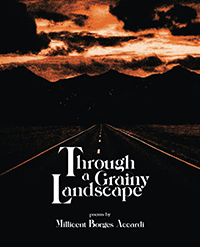Verdad Magazine Volume 33
Fall 2022, Volume 33
Through a Grainy Landscape
By
Millicent Borges Accardi
New Meridian, 2021
Review by Bill Neumire
Growing up the child of Portuguese parents in an America never quite hospitable, never quite fulfilling, the speaker in Millicent Borges Accardi’s collection, Through a Grainy Landscape, stubbornly builds herself anew each day. For muse, Accardi responds to artists and writers of Portuguese heritage–indeed, most of the poems start with an epigraph from or dedication to one of her muses, inspirations ranging from Tiago Araújo, Nuno Júdice, and Luís Quintais, to Amy Sayre Baptista and Noel Quiñones.
The word saudade means “a feeling of longing, melancholy or nostalgia that is supposedly characteristic of the Portuguese or Brazilian temperament,” and that sense of nostalgic melancholy is a subtextual engine throughout the book. Accardi, the author of Injuring Eternity (World Nouveau) and Woman on a Shaky Bridge (Finishing Line Press), gives us a speaker who suffers from a recent relationship split, the event described in these blunt terms from ‘Letting Yourself Look Silly Or Ridiculous’: “Leaving a note in his schedule book, / the color of ripe plums, ‘break up with M.’” The resulting state of the speaker is a feeling of invisibility and a lack of identity with a “wake inside [that] hides her.” The separation in her adult life ricochets her back to childhood as she re-hears the voice of her parents with their charged advice in this moment from the opening poem ‘A Man Sleeps, The Skies Move’:
We save money in a jar that looks
like water, the glass dense and broken,
in the jar. At any rate, you are born
in America. You are OK. Please, be
an adult. I know you are in kindergarten
and want to pick roses for your teacher,
but, please, listen and listen and listen
for a moment, listen for your whole life.
As a result, she looks to find herself in others saying, “I am exactly what people think / of me, a dark mixture / of all I have lost.” And this extends to her feelings about her family history; in the end, she feels herself “creating a photogenic life. / Objects, clothes. A mural of what it looked / like to be me.” The sadness of now connects to “Portuguese widows who prayed / and those who sang of sailors and their strong sea, / amid the sky that we wore like a cape.” The pained experience of abandonment in the present shakes loose her nervous, displaced family experience, as in these lines from ‘Lacuna: A Blank Space or a Missing Part’:
Melancholy
For an absent tongue, an absent island
Where we were born and left and then
Never born to, a family abandoning its
Land and itself moving into a larger state
Of being Memory alone
The way memory is triggered by wounds, the way the past overlays the present—waves of time become a motif throughout these pages as “they are bound / together, like time they have wagered and lost.” But the speaker gathers strength, asking what it is “that you say to remain only to travel into the next / cloth of happiness.” And she promises to “be true / to [her] own patience” even as she sees “yellow midnights / full of courage we cannot touch.”
Ultimately, Accardi “talk[s] to fill the wolf” through these poems that are in dialogue with her past, her family, her former and future selves. She recognizes that “everyone / succeeds in their weeping” but it feels like we, as readers, witness her building and rebuilding, taking aid from memory, from kin, from language itself. History, with its scars and warnings, reminds her of her invisibility but also her heritage and power, not the least of which, an early moment tells us, is found in her words, as best put in ‘Of a Verbal Silence’:
We say a few words,
Half-remembering what the last
Life of words should be, and we name
Off the flavor of our grief.
Flavors of our grief is not a bad description for these poems that speak with many voices, that funnel generations of life into the experience of their speaker who listens and listens and listens.
About the Author:
Millicent Borges Accardi, a Portuguese-American writer, is the author of four poetry books. Among her awards are fellowships from the National Endowment for the Arts (NEA), California Arts Council, CantoMundo, Fulbright, Foundation for Contemporary Arts NYC (Covid grant), Creative Capacity, Fundação Luso-Americana, and Barbara Deming Foundation, “Money for Women.” She’s led poetry workshops at Keystone College, Nimrod Conference, Rhode Island College, The Muse in Norfolk, Virginia, and the University of Texas, Austin. She has held notable readings at University of California at Riverside, Brown University, Rutgers, UMass Dartmouth, and the Carr Reading Series at the University of Illinois. She lives in the hippie-arts community of Topanga, CA where she curates two literary reading series: Kale Soup for the Soul and Loose Lips.
Through a Grainy Landscape by
Millicent Borges Accardi
published by: New Meridian Arts (October 31, 2021)
ISBN-10 : 1737249103
ISBN-13 : 978-1737249108

